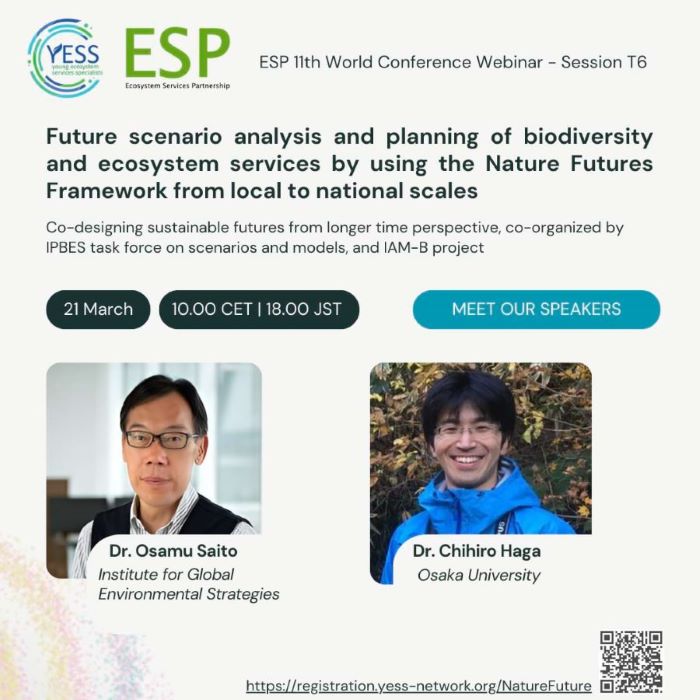Organised jointly by the Young ES Specialists (YESS), the Ecosystem Services Partnership (ESP), and the IPBES Task Force on Scenarios and Models.
Webinar: Future scenario analysis and planning of biodiversity and ecosystem services by using the Nature Futures Framework from local to national scales
 Date: 21 March 2025, 10:00 CET / 18:00 JST
Date: 21 March 2025, 10:00 CET / 18:00 JST
The Nature Futures Framework (NFF) is a flexible tool designed to support the development of scenarios and models of desirable futures for people, nature and Mother Earth. Following the 2016 Scenarios and models assessment, the IPBES scenarios and models expert group developed this framework. The NFF has since been applied to diverse research questions in equally diverse locations. This webinar is a preview of the session T6 a ESP 11 World Conference and part of the project “Development of an Integrated Assessment Model linking Biodiversity and Socio-Economic Drivers, and its Social Application” (IAM-B).
Join us for this webinar to
- learn about the background and development of the Nature Futures Framework.
- hear about technical updates to the NFF.
- explore case studies in Japan.
We will further provide a peek into the NFF Community of Practice engaging with IPBES that was recently formalised in 2024 and that you are invited to join.
You might also be interested in the NFF Community of Practice: visit their new website and join the group. Do you want to know more about Communities of Practice engaging with IPBES? Download the poster series.
—
Who you will meet
Speakers
- Dr Osamu Saito is a Principal Policy Researcher at the Institute for Global Environmental Studies (IGES) in Japan. He has been working on the interlinkages between ecological, human and social systems through sustainability science approaches.
- Dr Chihiro Haga is a Specially Appointed Assistant Professor at Osaka University in Japan. He is developing and applying data science technologies in landscape ecology arena, working towards a society where nature’s diverse values are integrated into decision-making processes.
Moderators
- Nita Shashidharan is a PhD student at the Ashoka Trust for Research in Ecology and the Environment (ATREE) in India.
- Sakshi Rana is a Junior Research Fellow and PhD scholar at the Wildlife Institute of India.
- Dr Thomas Schmitt is a postdoctoral researcher at Karlsruhe Institute of Technology in Germany.
—
Edited post from Franziska Fischer from ONet
Photo by hcsh! on Flickr: Foggy wetland on the island of Hokkaido in Japan. Chihiro Haga et al. (2023) modelled desirable futures at local scale by combining the Nature Futures Framework (NFF) and multi-objective optimisation. For their study, they chose the Bekanbeushi River watershed in North-eastern Japan on Hokkaido, whereby the Bekanbeushi River wetland — located in the middle of the watershed — had been listed in the Ramsar Convention in 1993. Find out more in their publication. For further practical examples that apply the NFF, see the NFF website.
